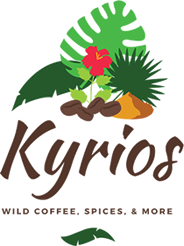Today only 2,000 sq. km of wild coffee growing rain forest remains in Ethiopia, and only 5% of all Ethiopian coffee can be considered wild. Because coffee plantations produce a much higher coffee yield than a natural coffee forest, local populations have a strong incentive to clear their natural forests and create coffee plantations. Much of Ethiopia’s rain forests have been cleared to grow cash crops, and wild coffee was projected to become extinct by the year 2020 once the rain forest disappears forever.
In the last decade however, organizations from around the world have partnered with the Ethiopian Government and the local people of Ethiopia to avert this ecological disaster. Programs have been put in place to ensure that wild coffee is not being over-harvested, and that the coffee rain forests are not being abused in any way. Environmental experts agree that the key to halting deforestation is to add economic value to the natural coffee forest. This can be accomplished by bringing to the international public the rain forest’s most delicious product – 100% natural, 100% organic Ethiopian Wild Coffee. Together, we can support rain forest conservation, natural food produce, small village farming, and the preservation of the purest coffee in the world by filling our cups with Ethiopian Wild Coffee.
How is Kyrios Coffee different?
Conventional coffee (of which is served 99% of the time at the big coffee makers) is among the most heavily chemically treated foods in the world. It is steeped in synthetic fertilizers, pesticides, herbicides, fungicides, and insecticides – a real mouthful with a bad taste. Not only does the environment suffer from this overload, but so do the people who live in it. Farmers are exposed to a high level of chemicals while spraying the crops and while handling them during harvest. The surrounding communities are also impacted through chemical residues in the air and water. These chemical presences are not just unpleasant; many are highly toxic and detrimental to human health.
In the case of organic coffee, there are no synthetic fertilizers or chemicals used in growing or production, which means cleaner beans, air, land, and water. Our wild coffee isn't even grown with fertilizers, coffee pulp, or compost because it's not needed.

As a bonus, organic coffee beans are richer in healthful antioxidants, and many people can even taste the difference. Your health, and the health of the planet, both get a boost.
